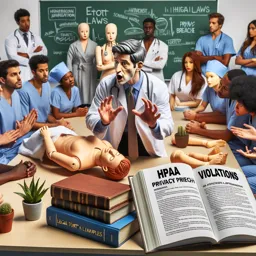Join the free Introduction to the Nursing Profession course with 51 content pages, covering a vast range of nursing topics. Includes free certification!
Course content
History of Nursing
2Nursing Theories and Models
3Nurse's Roles and Responsibilities
4Ethics and Legality in Nursing
5Communication in Nursing
6Patient safety
7Infection Control
8Nursing and Public Health
9Nursing Care for the Adult Patient
10Pediatric Nursing Care
11Geriatric Nursing Care
12Maternal and Neonatal Nursing Care
13Mental Health Nursing
14Nursing in the Emergency department
15Technology and Informatics in Nursing
16Nursing in Critical and Intensive Care
17Pharmacology for Nurses
18Technical Procedures in Nursing
19Nursing Administration
20Nursing in Oncology
21Nursing in Cardiology
22Nursing in Nephrology
23Nursing in Neurology
24Nursing in Endocrinology
25Nursing in Gastroenterology
26Nursing in Dermatology
27Nursing in Orthopedics
28Nursing in Ophthalmology
29Nursing in Otorhinolaryngology
30Nursing in Urology
31Nursing in Pulmonology
32Nursing in Immunology
33Nursing in Hematology
34Nursing in Rheumatology
35Nursing Research
36Nursing Education
37Nursing in Palliative Care
38Occupational Health Nursing
39Environmental Health Nursing
40Family Health Nursing
41Women's Health Nursing
42Men's Health Nursing
43Child and Adolescent Health Nursing
44Elderly Health Nursing
45Collective Health Nursing
46Indigenous Health Nursing
47Health Nursing of Vulnerable Populations
48Health Nursing of Homeless Populations
49Health Nursing of Populations from the Field, Forest and Waters
50Health Nursing of Quilombola Populations
51Health Nursing of Populations in Situations of Deprivation of Liberty
Course Description
Welcome to the "Introduction to the Nursing Profession" course—a comprehensive and engaging journey into the multifaceted world of nursing. Spanning 51 pages, this course is meticulously crafted for those keen on delving into the depth and breadth of the nursing profession, and it proudly stands within the Health category under the Nursing subcategory.
The course begins with a fascinating exploration of the History of Nursing, tracing the evolution of this noble profession from its earliest days to its modern-day practices. This historical foundation paves the way for a detailed examination of Nursing Theories and Models, which provide the conceptual frameworks that guide nursing practice and research.
Moving forward, the course delves into the Roles and Responsibilities of Nurses, offering insights into the various roles nurses play in different healthcare settings and the responsibilities they shoulder. Ethics and Legality in Nursing are also covered, ensuring that learners understand the ethical principles and legal standards that underpin professional practice.
Effective Communication in Nursing is highlighted next, underscoring its importance in fostering patient relationships and ensuring quality care. This naturally leads to discussions on Patient Safety and Infection Control, both critical components of nursing care aimed at protecting patients and healthcare workers alike.
The course also emphasizes the nurses' role in Public Health, detailing their involvement in community health initiatives and population health management. Specialized Nursing Care is thoroughly explored, ranging from Adult, Pediatric, and Geriatric care, to Maternal and Neonatal Nursing. Each of these sections provides specific knowledge and skills required for caring for distinct patient groups.
Mental Health Nursing and Nursing in the Emergency Department are also discussed, providing strategies for managing psychological well-being and acute care scenarios. Another vital aspect is Technology and Informatics in Nursing, showcasing the integration of technology in enhancing patient care and streamlining nursing processes.
Critical and Intensive Care nursing is covered extensively, preparing students for the high-stakes environments of ICUs. This is complemented by detailed insights into Pharmacology for Nurses, equipping them with the knowledge to administer medications safely and effectively.
Technical Procedures in Nursing are outlined, offering a practical guide to the hands-on aspects of nursing. Additionally, the course delves into Nursing Administration, addressing the leadership and management skills necessary for efficient healthcare delivery.
Specialty areas such as Oncology, Cardiology, Nephrology, Neurology, Endocrinology, Gastroenterology, Dermatology, Orthopedics, Ophthalmology, Otorhinolaryngology, Urology, Pulmonology, Immunology, Hematology, and Rheumatology are explored in detail, presenting the specialized knowledge required for each field.
Research and Education within nursing are emphasized, highlighting the importance of evidence-based practice and lifelong learning. Palliative Care Nursing equips nurses with the compassion and skills needed to support patients with life-limiting illnesses.
Occupational and Environmental Health Nursing are covered, reflecting the nurse's role in promoting safe work and living environments. Family, Women's, Men's, Child and Adolescent, and Elderly Health Nursing chapters focus on the specific health needs and care strategies for these populations.
Finally, the course addresses the unique health needs of Vulnerable, Homeless, Quilombola, Indigenous populations, and those in Situations of Deprivation of Liberty, including populations from the Field, Forest, and Waters. This ensures comprehensive knowledge in providing equitable and culturally competent care.
This free course includes:
1 hours and 56 minutes of audio content
Digital certificate of course completion (Free)
Exercises to train your knowledge
100% free, from content to certificate
Ready to get started?
In the app you will also find...
Over 5,000 free courses
Programming, English, Digital Marketing and much more! Learn whatever you want, for free.
Study plan with AI
Our app's Artificial Intelligence can create a study schedule for the course you choose.
From zero to professional success
Improve your resume with our free Certificate and then use our Artificial Intelligence to find your dream job.
You can also use the QR Code or the links below.


















